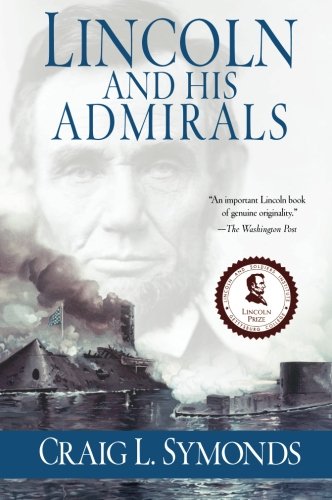
McPherson: We know from [the diary of] John Hay that Lincoln put himself through a cram course of readings in military history and strategy during the fall and winter of 1861-62, mainly so he could deal more intelligently and forcefully with such generals as McClellan, Halleck, and Buell. Did Lincoln do anything comparable to overcome his admission that he knew "little about ships"?
Symonds: Not really. A lifelong autodidact, Lincoln focused on learning as much as he could about war in the first months of the conflict, but he saw from the beginning that the land war was far more important than the naval war. While he read all that he could about the theories of war, he did not undertake a similar regimen concerning naval strategy, in part because there were fewer such books. He was fascinated by new weaponry, played a role in getting the Navy to adopt Ericsson's Monitor, and he consulted both Seward and Bates on the legality of the blockade, but for the most part, he relied on Gideon Welles, and especially the Assistant Navy Secretary, Gustavus Fox, to provide him with whatever professional knowledge or technical information he needed.
McPherson: Historians hold a wide range of opinions about the effectiveness of the blockade and how important a role it played in ultimate Union victory. Where do you stand on this question?
Symonds: I guess it depends on whether the glass is half full or half empty. The blockade was never impervious, and at times seemed quite porous. As many have argued, the South was able to import through the blockade the weapons and supplies it needed to sustain its armies in the field for four years, though it did encounter serious shortages in specific areas such as steam engines, engine parts, and railroad rails. Exports were a different story. Cotton exports plunged from 2.8 million bales in the last year of peace to only 55,000 bales in the first year of war. That undercut the Confederacy's ability to establish credit overseas, contributed to inflation and civilian unrest at home, and generally undermined the Confederate economy. The loss of southern revenue from cotton exports was greater than the amount the North spent to establish and maintain the blockade. Given that, I think the blockade was worth the investment. If it succeeded in shortening the war by, say, six month, it probably saved many thousands of lives.
McPherson: Along with Gideon Welles and Gustavus Fox, Lincoln was critical of Samuel Francis Du Pont for lack of aggressiveness and pertinacity in the failed attack on the defenses of Charleston on April 7, 1863, and compared Du Pont to McClellan. Was this fair?
Symonds: There are many things in war that are not fair. Du Pont was very likely correct in asserting that Charleston could not be taken by a purely naval attack, as Gideon Welles repeatedly encouraged him to do, and he was effectively fired for demonstrating that his view was correct. [Historian] Kevin Weddle calls Du Pont "Lincoln's Tragic Admiral," a victim of Welles' determination to protect the reputation of his beloved monitors. But Du Pont's fall from grace was due not merely to his failure to capture Charleston. It was also due to two other factors: one was that Lincoln had become scarred by his lengthy and frustrating relationship with McClellan during the 1862 campaign, and by 1863 he had began to view Du Pont through a prism defined by that experience. When Du Pont called for reinforcements, or bemoaned the obstacles in front of him, it was McClellans' voice that Lincoln heard. The other reason for Du Pont's fall is that he never fully explained to the President precisely why he objected to a navy-only attack. Instead he only hinted at it by detailing how strong the enemy defenses were and how limited his own forces were. He never clearly laid out an alternative with the kind of strong advocacy that showed his willingness to carry it out. Even then, I think Lincoln would have stood by Du Pont but for Du Pont's own foolish behavior when he insisted that the government must publish his official reports (including compromising information about the vulnerabilities of the monitors) in order to counter hostile newspaper articles about him. In the end, Du Pont's reticence and touchiness were responsible for his tragedy.
McPherson: Did Lincoln show unjustified favoritism toward John A. Dahlgren when he promoted him to Rear Admiral and gave him command of the South Atlantic Blockading Squadron even though Dahlgren had limited experience in seagoing command?
Symonds: Dahlgren was unquestionably Lincoln's favorite admiral. He much appreciated Farragut's success, but he liked Dahlgren, often went to the Washington Navy Yard to visit with him, and eventually he asked Welles to promote him to admiral, even though Dahlgren had virtually no important sea service. Most of the navy looked upon Lincoln's decision to promote his friend from commander to Rear Admiral in one step as personal favoritism. It was favoritism, but whether it was unjustified depends on how well Dahlgren performed in command. Though Charleston never fell, Dahlgren was an active and effective commander of the South Atlantic Blockading Squadron, and despite suffering poor health that might have ended the career of a less determined man, Dahlgren worked hard and earned the confidence of his officers throughout the long and wasting siege.
McPherson: From 1862 on, Acting Rear Admiral Samuel Phillips Lee wanted to attack the defenses of Wilmington to shut down the port to blockade runners. When the time came in 1864 to carry out the attack, however, Welles, Fox, and Grant convinced Lincoln that Lee was not the man to command it, and replaced him with Rear Admiral David Dixon Porter. Was this treatment of Lee justified?
Symonds: Like Du Pont, Phillips Lee was a competent officer who was at his best managing the multivariate activities of a far-flung squadron. Unlike Du Pont, he never had the chance to prove himself in a major battle and thereby win promotion to the permanent rank of Rear Admiral. Because the authorizing legislation stipulated that promotions to admiral must be won in battle, Lee repeatedly asked Welles for permission to attack Wilmington, North Carolina. Not until 1864 did Welles accede, and when he did he sent Lee off to the backwater of the Mississippi Squadron and brought in the brash David Dixon Porter to carry it out. Lee felt himself a victim of Welles' favoritism for others. But in this case, it was U. S. Grant as much as Gideon Welles who was responsible. In Grant's view, Lee had not been sufficiently aggressive during the move up the James River, and he wanted someone else to command of the attack on Wilmington. When Farragut declined the command, Welles gave it to Porter. Lee's anger at this treatment is understandable, but Welles and Grant had concluded that while Lee was an effective manager, he was not the man for a full-scale attack. In the end, Lee never did get a chance to prove himself in the kind of engagement that might have won him the promotion he sought. Read more
Now you can buy Books online in USA,UK, India and more than 100 countries.
*Terms and Conditions apply
Disclaimer: All product data on this page belongs to  .
.
No
guarantees are made as to accuracy of prices and information.









 .
.


